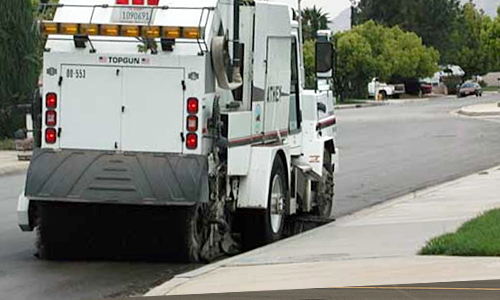Street Sweeping

Street sweeping is conducted twice monthly in accordance with the City’s approved street sweeping calendar.
To find out when street sweeping is scheduled for your area of town, see the street sweeping map or street sweeping schedule:
- Moreno Valley Map Viewer
To view or print the street sweeping calendar, click on the above link to open the Moreno Valley Map Viewer. When the viewer opens, click on the "I want to...." drop-down menu in the upper left corner of the map viewer; select "Create a Street Sweeping Calendar". This option will open a window where you can input an address. A calendar will open in a separate window for viewing or printing.
About Street Sweeping
Street Sweepers remove debris from our streets and prevent it from entering our storm drains. Street sweeping also helps the City comply with state and federal stormwater quality requirements. The City sweeps approximately 18,000 curb miles a year.
The street sweepers are not designed to pick up large pieces, piles or wet debris. Here’s how you can help improve the cleanliness of your street:
- Avoid piling leaves or other debris in the street or gutter.
- Don’t rake, sweep, blow leaves or other debris in the street or gutter.
- Keep palm fronds and long twigs and branches out of the street or gutter.
- Remove portable basketball hoops and RV access ramps from the street or gutter.
More Street Sweeping Tips
- Parking
Vehicles are prohibited from parking on the street on street sweeping days. Any vehicles found parked on the street can receive a parking ticket. - Rainy Days
Street sweeping may or may not occur on rainy days. If the streets are too wet, sweepers cannot remove debris. It is advised that you always move your vehicle in accordance with the posted street sweeping signs. - Remember: Only rain in the drain.
Storm drains lead straight to the ocean and are meant for rainwater only. It is against the law to throw anything into the gutter – like litter, leaves, pet waste or auto fluids like motor oil – because they will pollute our ocean.
